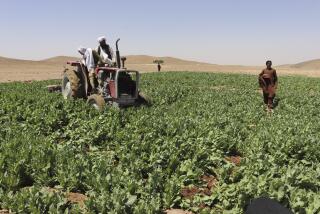Drug Trade Is ‘No. 1 Issue,’ Bhutto Declares
- Share via
RAWALPINDI, Pakistan — Prime Minister Benazir Bhutto declared Saturday that Pakistan’s booming illegal narcotics trade is “the number one national issue” facing her new government, and she vowed to crack down on a drug pipeline that has sent thousands of pounds of heroin onto U.S. streets annually and created the world’s second-largest addict population in her own country.
In her first press conference since taking office, the 35-year-old premier said: “I have personally seen families that have been destroyed because their children became heroin addicts. . . . It’s a very wide problem in Pakistan, and we have to crack down on it.”
The issue has been a key irritant in Pakistan’s relations with the United States, the final destination of most of the 200 tons of illegal opium grown and refined into pure heroin annually along Pakistan’s troubled border with Afghanistan.
Since Bhutto’s rise to power, U.S. officials have privately expressed concern that the young leader, who has formed an alliance with a pro-opium-growing political party in the region, might be softer on the drug producers and dealers than the military government of her predecessor, the late President Zia ul-Haq.
But Bhutto insisted that she will intensify the government’s effort to eradicate the large opium poppy fields and scores of heroin laboratories in Pakistan’s North-West Frontier province, despite her alliance with politicians who have said heroin production should be allowed to keep the region’s impoverished farmers from starving.
In her news conference, Bhutto also voiced pro-American positions on several other foreign policy issues involving U.S. interests in the region. Pakistan is a close U.S. ally and is receiving more than $4 billion under a six-year U.S. aid package.
Bhutto praised Washington for its “moral support for the restoration of democracy” in Pakistan, and she restated her pledge not to pursue a nuclear weapons program--an issue that once provoked a cutoff of U.S. aid to Pakistan.
Declaring that “the nuclear issue has also been a bugbear” for Pakistan during the many years in which Zia deliberately encouraged world suspicion that Pakistan was developing a nuclear bomb, Bhutto said, “We want a weapons-free policy, and we also do not want any doubts to arise and cloud this issue and isolate Pakistan at a time when there is so much good will for it.”
On the issue of Afghanistan, where both the United States and Pakistan have provided billions of dollars in aid for more than 3 million refugees and for guerrillas fighting the Kabul government and Soviet troops, Bhutto described her policy as “continuity.”
Committing herself to following Zia’s U.S.-backed policies toward Pakistan’s neighbor, Bhutto said she hopes the Soviet pullout, begun last May, will be completed by Feb. 15, as scheduled under accords signed last April, and that the millions of refugees now in Pakistan will return home.
Announcing her first Cabinet appointments, Bhutto pleased U.S. officials by signaling her intention to retain incumbent Foreign Minister Sahabzada Yaqub Khan, an internationally respected technocrat.
More to Read
Sign up for Essential California
The most important California stories and recommendations in your inbox every morning.
You may occasionally receive promotional content from the Los Angeles Times.













